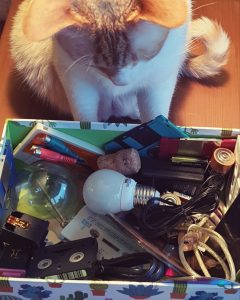TIPS FOR RECYCLING AT HOME
First, it is essential to think about reducing (not generating that waste) or reusing (give another use to that “waste”), before recycling. Obviously, we will always have some waste at home, what to do with it?
Contents of the article
What is better (or less harmful) for the environment?
- Juices: in a carton or in a plastic bottle?
- Soft drinks: in an aluminium can or in a glass bottle?
- Fruits: in a white polystyrene tray, in a plastic bag?
- Meats: in…?
It is difficult to know which is better, among other things because the experts, depending on the eye of the beholder, offer data that often contradict each other.
In reality, to find out with absolute certainty, we would have to calculate how much it costs to manufacture, distribute, recycle each of these products (the bottle, the carton, the can, the bag) and, if they are not recycled, how much does it cost the environment to bear an object that may take hundreds of years to “desintegrate”.
WHAT IS IT WE DO KNOW?
The bottom line is that whenever we can, we should buy:
- Proximity products
- Unpackaged products
And when that is impossible, we should think about what is better (or less bad) for the environment.
Yogurts, preserves: large or small container?
Water, yogurts, juices, fruit in syrup, etc., are always better in a large container.
It is very expensive to “package” minuscule amounts of liquid and food.
Milk and water: in glass, in carton or in a plastic container?
Glass is the best option because it is one hundred percent recyclable (and reusable) on multiple occasions.
Plastic bottles are also recycled, but not always. Only PET from water bottles can be converted back into a container that is in contact with food.
With the carton everything is a little more complicated because it is made of cardboard, plastic and aluminium.
Cardboard (75%) is recycled, but polyethylene (20%) and aluminium (5%) are likely to end up in a landfill or burned for energy.
Soft drinks and other beverages, in aluminium cans or in glass bottles?
Both aluminium cans and glass and plastic bottles require a large amount of energy to manufacture and transport.
Aluminium can be 100% recovered and could be just as good an option as glass, because if a bottle could be recycled up to 50 times, an aluminium can could be recycled almost indefinitely.
Fruits, vegetables, bread, meats…
Use reusable containers (the traditional lunch boxes, today’s Tupperware) to transport and store food, a reusable bag for bread, and a shopping trolley to transport fruit and vegetables. The comfortable trolley with wheels of a lifetime.
Avoid single-use plastic bags. Even “biodegradable” plastic bags, just in case, because, according to some experts, despite the plant material in their composition, most contain plastic that is not degradable.
The best option is reusable bags, which can be made of cloth or other materials.
And to wrap the sandwich or store food in the fridge?
Forget about aluminium foil or plastic film: a tupperware is always better, that is, a container with a cover. And if it is to always have at home, better if it is made of glass.
Detergents, soaps, conditioners, shampoos?
Dedicate 5 minutes of your time to reading the labels of the containers.
If the product carries the European Ecological Label (EU Ecolabel) for detergents, dishwashers, soaps, shampoos, conditioners and multi-purpose cleaners, you have a guarantee.
Probably, by buying these products, and not those without the label, we will reduce the adverse environmental effects.
But it’s also not a bad idea to check if there is a store near your home dedicated to selling biodegradable products for cleaning the house and personal hygiene: bulk products without sulphates, phosphates, nickel free, not tested on animals and in returnable containers.
For the washing machine, better than soap, a bag with soapnuts to wash. Soapnuts leave clothes fresh and clean like never before, and with no environmental residue! Search the internet for ‘washing machine soap nuts’ and you will be surprised. At Blipvert we have been using them for years, and we underline this as a guarantee.
Is it possible to achieve a zero-waste home?
If you follow these tips, you will see that your garbage bag will completely disappear.
Organic: Separating your organic waste is essential. This is the bag that you must have close at hand in the kitchen, and that you have to recycle in the brown (organic) container every day since it is a biodegradable waste that generates odours. Remember that the bags used for the organic waste must be biodegradable.
Get creative!: Making your own color-labeled bins with your family can be a lot of fun and inspire you to recycle more often.
Containers and Paper/Cardboard: these are the two most important groups of waste, which you must collect in the smallest space possible. For this, we suggest that you use vertical containers that are as accessible as possible (Tall and narrow containers help in small spaces). If we fold the cardboard, and compact the plastics and metal cans, we should be able to visit the yellow containers (packaging) and blue (paper and cardboard) fewer times.
Glass: We suggest you put the glass bottles (if there are few) in the container or paper bag (the one that suits you best on each occasion), and recycle them first as soon as you get to the green container (glass), which is always next to yellow and blue, where we recycle packaging and paper.
Medications: On the day that the medicine cabinet is cleaned, all expired products or those that you wish to recycle must be stored and taken to the white container (which you will find in your nearest pharmacy).
Special mini-waste: Keep in a small box the following household waste that cannot go to any selective collection container but that you cannot throw away either: batteries, waste of electrical and electronic devices of small format such as remote controls, mobile phones or chargers, printer cartridges, CD/DVD discs, and LED and energy-saving light bulbs. You can recycle the entire contents of the box in a single trip to your nearest Urban Recycle Stations or “Minis”, but if your town does not yet have an Urban Recycle Station service, you must recycle them at the nearest municipal Clean Point.
Bulky waste: It is always recycled at the nearest Clean Point. Find out about the schedules before making the trip and ask if your municipality has a home collection service, a service that is very common for this type of waste.
Blipvert Recologics, 2022
Check our website



